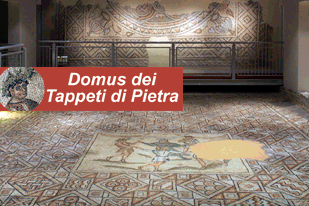Casa Da Polenta. Dante 's era.






Casa Da Polenta in Ravenna. Hotels near Casa Da Polenta .
Photo:1)façade of one Casa Da Polenta, in Zagarelli alle Mura Street, 2)a detail of the façade,3)the emblem of the dioceses, 4) the church in Polenta on the romagna hills, hear Dante Alighieri stopped, 5)inside the church,6)the Romagna hills
A land register of urban buildings compiled in the mid 14th century lists the property owned in the city by the leading families of Ravenna, by ecclesiastical bodies and corporations.
Only a few remains of these buildings still remain today. According to this land register the finest of the Da Polenta residences were located behind the town walls, overlooking the banks of the Padenna (the main canal that flowed at the side here between via Mazzini and via Baccarini).
Some of the remains found in this area are in fact thought to have been the residence of this family, as the austere, or even crude façade of the house was by tradition attributed to the family that dominated the city. It is also believed that this house was the birthplace of Francesca, cited by Dante in the 5th canto of his Inferno.
The Da Polenta family, the name of which is derived from a castle on the nearby Romagna hills, established themselves in the city between the 12th and 13th centuries. They firmly supported the Guelf faction, and succeeded in dominating the local nobility, by exploiting internal rivalry, instigating privileged relations with the diocesan curia and by extending their estate.
During the last twenty years of the 13th century, with Guido Minore and then with Lamberto, they succeeded in consolidating their political power controlling the main public posts, and also taking up the post of podestà for life. Their harsh domination, which was not without contestation, lasted until 1441, when the Venetians took over power.
So that all the assets of the Polenta family were transferred into the hands of the Republic of Venice, that gave this house to the Dioceses of Porto, one of the four great abbeys of the city: the emblem of the dioceses remains embedded in the walls high up above the entrance.
In the 19th century the house passed into the hands of Alfredo Brandolini, who in fifty years of passionate activity, collected hundreds of examples of the local bird species typical of the lower Ravenna area, forming the Brandolini Ornithological Museum, which was originally housed here.
Prof. Gianni Morelli
The pleasure of fine accommodation in the centre of Ravenna: we recommend the Fabbri hotels for a pleasant stay as follows:
The Centrale Byron hotel, 3-star, in the centre of Ravenna, close to the Casa Da Polenta ;
The Bisanzio Hotel, 4-star hotel in the centre of Ravenna, near the Casa Da Polenta ;
Once you have reached the hotel and parked your car, forget it and walk everywhere, because everything is within walking distance.
The railway station is near our hotels and within walking distance of them.
© reserved copyright
-





